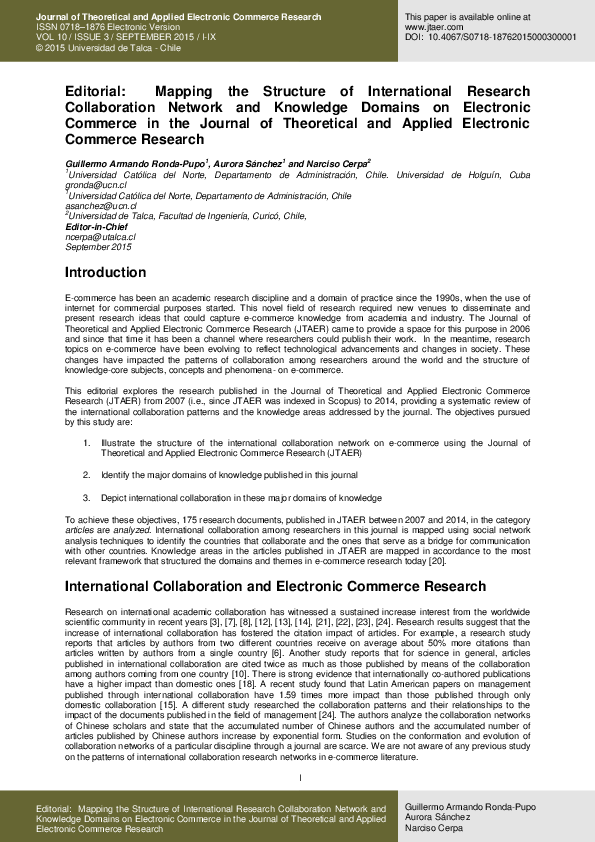用户社区:促进 KIBS 创新的缺失环节
IF 5.1
3区 管理学
Q1 BUSINESS
Journal of Theoretical and Applied Electronic Commerce Research
Pub Date : 2024-08-23
DOI:10.3390/jtaer19030102
引用次数: 0
摘要
在当今知识驱动型经济中,利益相关者之间的合作对于创新趋势的形成至关重要,而知识密集型商业服务(KIBS)在满足市场需求方面发挥着核心作用。创新生态系统框架已考虑到用户参与产品和服务的塑造。将用户社区(UC)纳入创新合作伙伴关系可以降低服务/产品开发的风险,提高可持续性和市场接受度。然而,对资源、吸收能力和隐性知识等能力的需求往往是忽视这一重要贡献者的原因。KIBS 拥有庞大的知识库,能够迎合数字工具的需求,并与不同的合作伙伴一起调解和推动创新,得益于独有的认知接近性,能够将现有知识与来自社区的新兴信息重新混合,形成新的产品和服务。本研究旨在通过三种积极的合作形式(共同创造、大规模定制和个性化),评估和量化与用户社区的合作对 KIBS 开发的不同创新类型的影响。所有创新类型都证明了用户社区的重要性。稳健性分析证实了 P-KIBS 和 T-KIBS 的结果。P-KIBS可能更适合产品和服务创新、流程个性化以及组织和营销创新的共同创造政策。而 T-KIBS 则侧重于大规模定制,确保创新取得成功。此外,与用户社区共同创造最适合产品创新。本文章由计算机程序翻译,如有差异,请以英文原文为准。
User Communities: The Missing Link to Foster KIBS’ Innovation
In today’s knowledge-driven economy, collaboration among stakeholders is essential for the framing of innovative trends, with knowledge-intensive business services (KIBS) playing a core role in addressing market demand. Users’ involvement in shaping products and services has been considered in innovation ecosystem frameworks. Fewer risks in service/product development, and more sustainability and market acceptance, are a few of the benefits arising from including the user community (UC) in innovation partnerships. However, the need for resources, absorptive capacity and tacit knowledge, among other capabilities, is often a reason for overlooking this important contributor. KIBS possess a vast knowledge base, cater to digital tools, and mediate and propel innovation with different partners, benefiting from exclusive cognitive proximity to remix extant knowledge with emergent information from communities into new products and services. The aim of this study is to assess and quantify the effect of the collaboration with UC through three active forms of collaboration (co-creation, mass customization, and personalization) on different innovation types developed in KIBS. The significance of the user community was proven across all innovation types. Robustness analysis confirmed the results for both P-KIBS and T-KIBS. P-KIBS may be better suited to co-creation policies for product and service innovation, personalization of processes, and organizational and marketing innovations. T-KIBS can focus on mass customization, ensuring good innovation success. Additionally, co-creation with user community is best for product innovation.
求助全文
通过发布文献求助,成功后即可免费获取论文全文。
去求助
来源期刊
CiteScore
9.50
自引率
3.60%
发文量
67
期刊介绍:
The Journal of Theoretical and Applied Electronic Commerce Research (JTAER) has been created to allow researchers, academicians and other professionals an agile and flexible channel of communication in which to share and debate new ideas and emerging technologies concerned with this rapidly evolving field. Business practices, social, cultural and legal concerns, personal privacy and security, communications technologies, mobile connectivity are among the important elements of electronic commerce and are becoming ever more relevant in everyday life. JTAER will assist in extending and improving the use of electronic commerce for the benefit of our society.

 求助内容:
求助内容: 应助结果提醒方式:
应助结果提醒方式:


